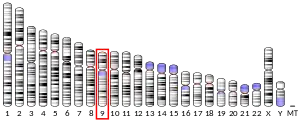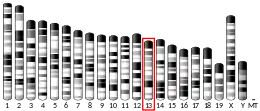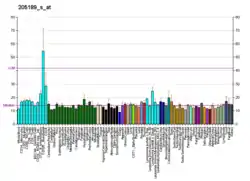Fanconi anemia, complementation group C
Fanconi anemia group C protein is a protein that in humans is encoded by the FANCC gene.[5][6] This protein delays the onset of apoptosis and promotes homologous recombination repair of damaged DNA. Mutations in this gene result in Fanconi anemia, a human rare disorder characterized by cancer susceptibility and cellular sensitivity to DNA crosslinks and other damages.[6][7]
| FANCC | |||||||||||||||||||||||||||||||||||||||||||||||||||
|---|---|---|---|---|---|---|---|---|---|---|---|---|---|---|---|---|---|---|---|---|---|---|---|---|---|---|---|---|---|---|---|---|---|---|---|---|---|---|---|---|---|---|---|---|---|---|---|---|---|---|---|
| Identifiers | |||||||||||||||||||||||||||||||||||||||||||||||||||
| Aliases | FANCC, Fancc, Facc, FA3, FAC, mir-3074-1, FACC, Fanconi anemia complementation group C, FA complementation group C | ||||||||||||||||||||||||||||||||||||||||||||||||||
| External IDs | OMIM: 613899 MGI: 95480 HomoloGene: 109 GeneCards: FANCC | ||||||||||||||||||||||||||||||||||||||||||||||||||
| |||||||||||||||||||||||||||||||||||||||||||||||||||
| |||||||||||||||||||||||||||||||||||||||||||||||||||
| |||||||||||||||||||||||||||||||||||||||||||||||||||
| |||||||||||||||||||||||||||||||||||||||||||||||||||
| Wikidata | |||||||||||||||||||||||||||||||||||||||||||||||||||
| |||||||||||||||||||||||||||||||||||||||||||||||||||
Structure
| Fanconi anaemia group C protein | |||||||||
|---|---|---|---|---|---|---|---|---|---|
| Identifiers | |||||||||
| Symbol | Fanconi_C | ||||||||
| Pfam | PF02106 | ||||||||
| InterPro | IPR000686 | ||||||||
| |||||||||
Function
A nuclear complex containing FANCC protein (as well as FANCA, FANCF and FANCG) is essential for the activation of the FANCD2 protein to the mono-ubiquitinated isoform.[8] In normal, non-mutant, cells FANCD2 is mono-ubiquinated in response to DNA damage. FANCC together with FANCE acts as the substrate adaptor for this reaction [9] Activated FANCD2 protein co-localizes with BRCA1 (breast cancer susceptibility protein) at ionizing radiation-induced foci and in synaptonemal complexes of meiotic chromosomes. Activated FANCD2 protein may function prior to the initiation of meiotic recombination, perhaps to prepare chromosomes for synapsis, or to regulate subsequent recombination events.[8]
FANCC(-/-) mutant male and female mice have compromised gametogenesis, leading to markedly impaired fertility, a characteristic of Fanconi anemia patients.[10] Both male and female FANCC mutant mice have reduced numbers of germ cells.[11]
Interactions
Fanconi anemia, complementation group C has been shown to interact with:
References
- GRCh38: Ensembl release 89: ENSG00000158169 - Ensembl, May 2017
- GRCm38: Ensembl release 89: ENSMUSG00000021461 - Ensembl, May 2017
- "Human PubMed Reference:". National Center for Biotechnology Information, U.S. National Library of Medicine.
- "Mouse PubMed Reference:". National Center for Biotechnology Information, U.S. National Library of Medicine.
- Strathdee CA, Duncan AM, Buchwald M (Jun 1992). "Evidence for at least four Fanconi anaemia genes including FACC on chromosome 9". Nature Genetics. 1 (3): 196–8. doi:10.1038/ng0692-196. PMID 1303234. S2CID 7341515.
- "Entrez Gene: FANCC Fanconi anemia, complementation group C".
- PMC, Europe. "Europe PMC". europepmc.org. Retrieved 2023-07-26.
- Garcia-Higuera I, Taniguchi T, Ganesan S, Meyn MS, Timmers C, Hejna J, Grompe M, D'Andrea AD (2001). "Interaction of the Fanconi anemia proteins and BRCA1 in a common pathway". Mol. Cell. 7 (2): 249–62. doi:10.1016/s1097-2765(01)00173-3. PMID 11239454.
- van Twest, S; Murphy, VJ; Hodson, C; Tan, W; Swuec, P; O'Rourke, JJ; Heierhorst, J; Crismani, W; Deans, AJ (19 January 2017). "Mechanism of Ubiquitination and Deubiquitination in the Fanconi Anemia Pathway". Molecular Cell. 65 (2): 247–259. doi:10.1016/j.molcel.2016.11.005. PMID 27986371.
- Chen M, Tomkins DJ, Auerbach W, McKerlie C, Youssoufian H, Liu L, Gan O, Carreau M, Auerbach A, Groves T, Guidos CJ, Freedman MH, Cross J, Percy DH, Dick JE, Joyner AL, Buchwald M (1996). "Inactivation of Fac in mice produces inducible chromosomal instability and reduced fertility reminiscent of Fanconi anaemia". Nat. Genet. 12 (4): 448–51. doi:10.1038/ng0496-448. PMID 8630504. S2CID 34666783.
- Whitney MA, Royle G, Low MJ, Kelly MA, Axthelm MK, Reifsteck C, Olson S, Braun RE, Heinrich MC, Rathbun RK, Bagby GC, Grompe M (1996). "Germ cell defects and hematopoietic hypersensitivity to gamma-interferon in mice with a targeted disruption of the Fanconi anemia C gene". Blood. 88 (1): 49–58. doi:10.1182/blood.V88.1.49.49. PMID 8704201.
- Reuter TY, Medhurst AL, Waisfisz Q, Zhi Y, Herterich S, Hoehn H, Gross HJ, Joenje H, Hoatlin ME, Mathew CG, Huber PA (Oct 2003). "Yeast two-hybrid screens imply involvement of Fanconi anemia proteins in transcription regulation, cell signaling, oxidative metabolism, and cellular transport". Experimental Cell Research. 289 (2): 211–21. doi:10.1016/s0014-4827(03)00261-1. PMID 14499622.
- Kupfer GM, Yamashita T, Naf D, Suliman A, Asano S, D'Andrea AD (Aug 1997). "The Fanconi anemia polypeptide, FAC, binds to the cyclin-dependent kinase, cdc2". Blood. 90 (3): 1047–54. doi:10.1182/blood.V90.3.1047. PMID 9242535.
- McMahon LW, Walsh CE, Lambert MW (Nov 1999). "Human alpha spectrin II and the Fanconi anemia proteins FANCA and FANCC interact to form a nuclear complex". The Journal of Biological Chemistry. 274 (46): 32904–8. doi:10.1074/jbc.274.46.32904. PMID 10551855.
- de Winter JP, van der Weel L, de Groot J, Stone S, Waisfisz Q, Arwert F, Scheper RJ, Kruyt FA, Hoatlin ME, Joenje H (Nov 2000). "The Fanconi anemia protein FANCF forms a nuclear complex with FANCA, FANCC and FANCG". Human Molecular Genetics. 9 (18): 2665–74. doi:10.1093/hmg/9.18.2665. PMID 11063725.
- Garcia-Higuera I, Kuang Y, Näf D, Wasik J, D'Andrea AD (Jul 1999). "Fanconi anemia proteins FANCA, FANCC, and FANCG/XRCC9 interact in a functional nuclear complex". Molecular and Cellular Biology. 19 (7): 4866–73. doi:10.1128/mcb.19.7.4866. PMC 84285. PMID 10373536.
- Reuter T, Herterich S, Bernhard O, Hoehn H, Gross HJ (Jan 2000). "Strong FANCA/FANCG but weak FANCA/FANCC interaction in the yeast 2-hybrid system". Blood. 95 (2): 719–20. doi:10.1182/blood.V95.2.719. PMID 10627486.
- Thomashevski A, High AA, Drozd M, Shabanowitz J, Hunt DF, Grant PA, Kupfer GM (Jun 2004). "The Fanconi anemia core complex forms four complexes of different sizes in different subcellular compartments". The Journal of Biological Chemistry. 279 (25): 26201–9. doi:10.1074/jbc.M400091200. PMID 15082718.
- Meetei AR, de Winter JP, Medhurst AL, Wallisch M, Waisfisz Q, van de Vrugt HJ, Oostra AB, Yan Z, Ling C, Bishop CE, Hoatlin ME, Joenje H, Wang W (Oct 2003). "A novel ubiquitin ligase is deficient in Fanconi anemia". Nature Genetics. 35 (2): 165–70. doi:10.1038/ng1241. PMID 12973351. S2CID 10149290.
- Taniguchi T, D'Andrea AD (October 2002). "The Fanconi anemia protein, FANCE, promotes the nuclear accumulation of FANCC". Blood. 100 (7): 2457–62. doi:10.1182/blood-2002-03-0860. PMID 12239156.
- Otsuki T, Young DB, Sasaki DT, Pando MP, Li J, Manning A, Hoekstra M, Hoatlin ME, Mercurio F, Liu JM (2002). "Fanconi anemia protein complex is a novel target of the IKK signalsome". Journal of Cellular Biochemistry (Submitted manuscript). 86 (4): 613–23. doi:10.1002/jcb.10270. PMID 12210728. S2CID 42471384.
- Léveillé F, Blom E, Medhurst AL, Bier P, Laghmani el H, Johnson M, Rooimans MA, Sobeck A, Waisfisz Q, Arwert F, Patel KJ, Hoatlin ME, Joenje H, de Winter JP (Sep 2004). "The Fanconi anemia gene product FANCF is a flexible adaptor protein". The Journal of Biological Chemistry. 279 (38): 39421–30. doi:10.1074/jbc.M407034200. PMID 15262960.
- Gordon SM, Buchwald M (Jul 2003). "Fanconi anemia protein complex: mapping protein interactions in the yeast 2- and 3-hybrid systems". Blood. 102 (1): 136–41. doi:10.1182/blood-2002-11-3517. PMID 12649160.
- Medhurst AL, Huber PA, Waisfisz Q, de Winter JP, Mathew CG (Feb 2001). "Direct interactions of the five known Fanconi anaemia proteins suggest a common functional pathway". Human Molecular Genetics. 10 (4): 423–9. doi:10.1093/hmg/10.4.423. PMID 11157805.
- Pace P, Johnson M, Tan WM, Mosedale G, Sng C, Hoatlin M, de Winter J, Joenje H, Gergely F, Patel KJ (Jul 2002). "FANCE: the link between Fanconi anaemia complex assembly and activity". The EMBO Journal. 21 (13): 3414–23. doi:10.1093/emboj/cdf355. PMC 125396. PMID 12093742.
- Cumming RC, Lightfoot J, Beard K, Youssoufian H, O'Brien PJ, Buchwald M (Jul 2001). "Fanconi anemia group C protein prevents apoptosis in hematopoietic cells through redox regulation of GSTP1". Nature Medicine. 7 (7): 814–20. doi:10.1038/89937. PMID 11433346. S2CID 35177844.
- Pang Q, Christianson TA, Keeble W, Koretsky T, Bagby GC (December 2002). "The anti-apoptotic function of Hsp70 in the interferon-inducible double-stranded RNA-dependent protein kinase-mediated death signaling pathway requires the Fanconi anemia protein, FANCC". The Journal of Biological Chemistry. 277 (51): 49638–43. doi:10.1074/jbc.M209386200. PMID 12397061.
- McMahon LW, Sangerman J, Goodman SR, Kumaresan K, Lambert MW (Jun 2001). "Human alpha spectrin II and the FANCA, FANCC, and FANCG proteins bind to DNA containing psoralen interstrand cross-links". Biochemistry. 40 (24): 7025–34. doi:10.1021/bi002917g. PMID 11401546.
- Pang Q, Fagerlie S, Christianson TA, Keeble W, Faulkner G, Diaz J, Rathbun RK, Bagby GC (Jul 2000). "The Fanconi anemia protein FANCC binds to and facilitates the activation of STAT1 by gamma interferon and hematopoietic growth factors". Molecular and Cellular Biology. 20 (13): 4724–35. doi:10.1128/mcb.20.13.4724-4735.2000. PMC 85895. PMID 10848598.
- Pang Q, Christianson TA, Keeble W, Diaz J, Faulkner GR, Reifsteck C, Olson S, Bagby GC (Sep 2001). "The Fanconi anemia complementation group C gene product: structural evidence of multifunctionality". Blood. 98 (5): 1392–401. doi:10.1182/blood.v98.5.1392. PMID 11520787. S2CID 12153966.
- Hoatlin ME, Zhi Y, Ball H, Silvey K, Melnick A, Stone S, Arai S, Hawe N, Owen G, Zelent A, Licht JD (December 1999). "A novel BTB/POZ transcriptional repressor protein interacts with the Fanconi anemia group C protein and PLZF". Blood. 94 (11): 3737–47. doi:10.1182/blood.V94.11.3737. PMID 10572087.
Further reading
- Strathdee CA, Gavish H, Shannon WR, Buchwald M (Apr 1992). "Cloning of cDNAs for Fanconi's anaemia by functional complementation". Nature. 356 (6372): 763–7. Bibcode:1992Natur.356..763S. doi:10.1038/356763a0. PMID 1574115. S2CID 4250632.
- Strathdee CA, Gavish H, Shannon WR, Buchwald M (Jul 1992). "Cloning of cDNAs for Fanconi's anaemia by functional complementation". Nature. 358 (6385): 434. Bibcode:1992Natur.358..434S. doi:10.1038/358434a0. PMID 1641028.
- Verlander PC, Kaporis A, Liu Q, Zhang Q, Seligsohn U, Auerbach AD (December 1995). "Carrier frequency of the IVS4 + 4 A-->T mutation of the Fanconi anemia gene FAC in the Ashkenazi Jewish population". Blood. 86 (11): 4034–8. doi:10.1182/blood.V86.11.4034.bloodjournal86114034. PMID 7492758.
- Yamashita T, Barber DL, Zhu Y, Wu N, D'Andrea AD (Jul 1994). "The Fanconi anemia polypeptide FACC is localized to the cytoplasm". Proceedings of the National Academy of Sciences of the United States of America. 91 (14): 6712–6. Bibcode:1994PNAS...91.6712Y. doi:10.1073/pnas.91.14.6712. PMC 44273. PMID 7517562.
- Segal GM, Magenis RE, Brown M, Keeble W, Smith TD, Heinrich MC, Bagby GC (Aug 1994). "Repression of Fanconi anemia gene (FACC) expression inhibits growth of hematopoietic progenitor cells". The Journal of Clinical Investigation. 94 (2): 846–52. doi:10.1172/JCI117405. PMC 296166. PMID 7518843.
- Youssoufian H (Aug 1994). "Localization of Fanconi anemia C protein to the cytoplasm of mammalian cells". Proceedings of the National Academy of Sciences of the United States of America. 91 (17): 7975–9. Bibcode:1994PNAS...91.7975Y. doi:10.1073/pnas.91.17.7975. PMC 44527. PMID 8058745.
- Whitney MA, Jakobs P, Kaback M, Moses RE, Grompe M (1994). "The Ashkenazi Jewish Fanconi anemia mutation: incidence among patients and carrier frequency in the at-risk population". Human Mutation. 3 (4): 339–41. doi:10.1002/humu.1380030402. PMID 8081385. S2CID 22001726.
- Murer-Orlando M, Llerena JC, Birjandi F, Gibson RA, Mathew CG (Sep 1993). "FACC gene mutations and early prenatal diagnosis of Fanconi's anaemia". Lancet. 342 (8872): 686. doi:10.1016/0140-6736(93)91800-2. PMID 8103176. S2CID 7355624.
- Maruyama K, Sugano S (Jan 1994). "Oligo-capping: a simple method to replace the cap structure of eukaryotic mRNAs with oligoribonucleotides". Gene. 138 (1–2): 171–4. doi:10.1016/0378-1119(94)90802-8. PMID 8125298.
- Verlander PC, Lin JD, Udono MU, Zhang Q, Gibson RA, Mathew CG, Auerbach AD (Apr 1994). "Mutation analysis of the Fanconi anemia gene FACC". American Journal of Human Genetics. 54 (4): 595–601. PMC 1918103. PMID 8128956.
- Whitney MA, Saito H, Jakobs PM, Gibson RA, Moses RE, Grompe M (Jun 1993). "A common mutation in the FACC gene causes Fanconi anaemia in Ashkenazi Jews". Nature Genetics. 4 (2): 202–5. doi:10.1038/ng0693-202. PMID 8348157. S2CID 12160503.
- Gibson RA, Buchwald M, Roberts RG, Mathew CG (Jan 1993). "Characterisation of the exon structure of the Fanconi anaemia group C gene by vectorette PCR". Human Molecular Genetics. 2 (1): 35–8. doi:10.1093/hmg/2.1.35. PMID 8490620.
- Gavish H, dos Santos CC, Buchwald M (Feb 1993). "A Leu554-to-Pro substitution completely abolishes the functional complementing activity of the Fanconi anemia (FACC) protein". Human Molecular Genetics. 2 (2): 123–6. doi:10.1093/hmg/2.2.123. PMID 8499901.
- Youssoufian H, Li Y, Martin ME, Buchwald M (Feb 1996). "Induction of Fanconi anemia cellular phenotype in human 293 cells by overexpression of a mutant FAC allele". The Journal of Clinical Investigation. 97 (4): 957–62. doi:10.1172/JCI118519. PMC 507141. PMID 8613549.
- Yamashita T, Wu N, Kupfer G, Corless C, Joenje H, Grompe M, D'Andrea AD (May 1996). "Clinical variability of Fanconi anemia (type C) results from expression of an amino terminal truncated Fanconi anemia complementation group C polypeptide with partial activity". Blood. 87 (10): 4424–32. doi:10.1182/blood.V87.10.4424.bloodjournal87104424. PMID 8639804.
- Lo Ten Foe JR, Rooimans MA, Joenje H, Arwert F (1996). "Novel frameshift mutation (1806insA) in exon 14 of the Fanconi anemia C gene, FAC". Human Mutation. 7 (3): 264–5. doi:10.1002/(SICI)1098-1004(1996)7:3<264::AID-HUMU11>3.0.CO;2-0. PMID 8829660. S2CID 27932876.
- Gibson RA, Morgan NV, Goldstein LH, Pearson IC, Kesterton IP, Foot NJ, Jansen S, Havenga C, Pearson T, de Ravel TJ, Cohn RJ, Marques IM, Dokal I, Roberts I, Marsh J, Ball S, Milner RD, Llerena JC, Samochatova E, Mohan SP, Vasudevan P, Birjandi F, Hajianpour A, Murer-Orlando M, Mathew CG (1996). "Novel mutations and polymorphisms in the Fanconi anemia group C gene". Human Mutation. 8 (2): 140–8. doi:10.1002/(SICI)1098-1004(1996)8:2<140::AID-HUMU6>3.0.CO;2-F. PMID 8844212. S2CID 11474873.
- Kupfer GM, Yamashita T, Naf D, Suliman A, Asano S, D'Andrea AD (Aug 1997). "The Fanconi anemia polypeptide, FAC, binds to the cyclin-dependent kinase, cdc2". Blood. 90 (3): 1047–54. doi:10.1182/blood.V90.3.1047. PMID 9242535.
- Suzuki Y, Yoshitomo-Nakagawa K, Maruyama K, Suyama A, Sugano S (Oct 1997). "Construction and characterization of a full length-enriched and a 5'-end-enriched cDNA library". Gene. 200 (1–2): 149–56. doi:10.1016/S0378-1119(97)00411-3. PMID 9373149.




